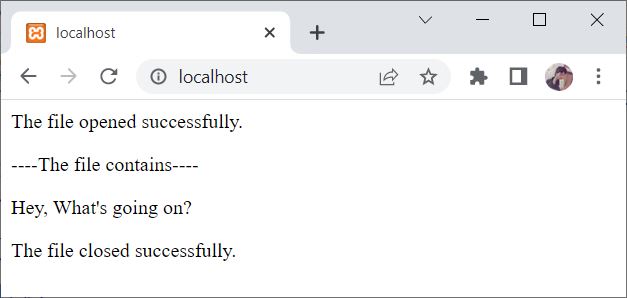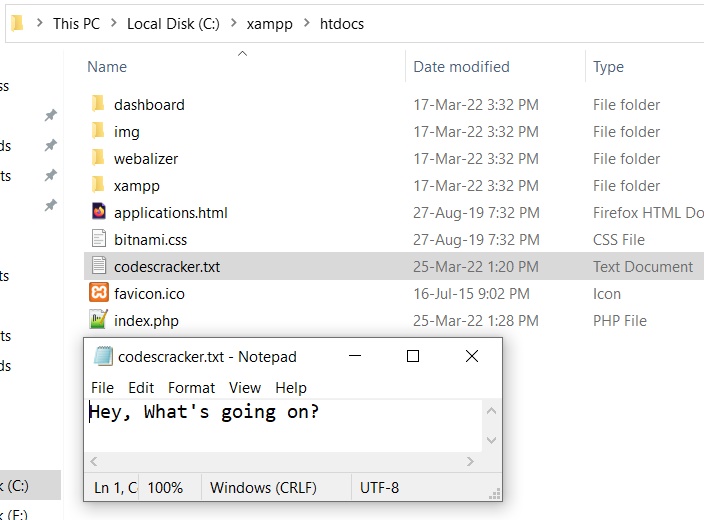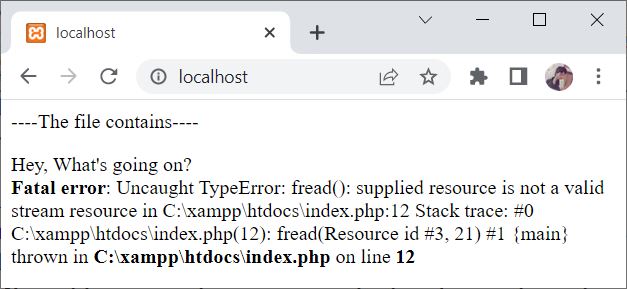- PHP Basics
- Learn PHP
- PHP Comments
- PHP Data Types
- PHP Variables
- PHP Operators
- PHP echo
- PHP print
- PHP echo vs. print
- PHP if else
- PHP switch
- PHP for Loop
- PHP while Loop
- PHP do...while Loop
- PHP foreach Loop
- PHP break and continue
- PHP exit()
- PHP exit() vs. break
- PHP isset()
- PHP Arrays
- PHP print_r()
- PHP unset()
- PHP Strings
- PHP Functions
- PHP File Handling
- PHP File Handling
- PHP Open File
- PHP Create a File
- PHP Write to File
- PHP Read File
- PHP feof()
- PHP fgetc()
- PHP fgets()
- PHP Close File
- PHP Delete File
- PHP Append to File
- PHP Copy File
- PHP file_get_contents()
- PHP file_put_contents()
- PHP file_exists()
- PHP filesize()
- PHP Rename File
- PHP fseek()
- PHP ftell()
- PHP rewind()
- PHP disk_free_space()
- PHP disk_total_space()
- PHP Create Directory
- PHP Remove Directory
- PHP Get Files/Directories
- PHP Get filename
- PHP Get Path
- PHP filemtime()
- PHP file()
- PHP include()
- PHP require()
- PHP include() vs. require()
- PHP mysqli Tutorial
- PHP mysqli Tutorial
- PHP and MySQL Setup
- PHP mysqli: Create Database
- PHP mysqli: Create Table
- PHP mysqli: Insert Record
- PHP mysqli: Update Record
- PHP mysqli: Fetch Record
- PHP mysqli: Delete Record
- PHP mysqli: SignUp Page
- PHP mysqli: LogIn Page
- PHP mysqli: Store User Data
- PHP mysqli Functions
- PHP mysqli_connect()
- PHP mysqli_close()
- PHP mysqli_connect_errno()
- PHP mysqli_connect_error()
- PHP mysqli_query()
- PHP mysqli_fetch_row()
- PHP mysqli_fetch_assoc()
- PHP mysqli_fetch_array()
- PHP mysqli_free_result()
- PHP mysqli_error()
- PHP mysqli_prepare()
- PHP mysqli_stmt_bind_param()
- PHP mysqli_stmt_execute()
- PHP mysqli_stmt_fetch()
- PHP mysqli_stmt_store_result()
- PHP mysqli_stmt_num_rows()
- PHP mysqli_stmt_bind_result()
- PHP mysqli_stmt_get_result()
- PHP mysqli_result class
- PHP mysqli_report()
- PHP error_reporting()
- PHP mysqli_real_escape_string()
- PHP htmlspecialchars()
- PHP Misc Topics
- PHP Object Oriented
- PHP new Keyword
- PHP header()
- PHP getallheaders()
- PHP Cookies
- PHP Sessions
- PHP Date and Time
- PHP GET vs. POST
- PHP File Upload
- PHP Image Processing
PHP fclose(): Close a File
The PHP fclose() function is used to close a file. Basically, it is used to break the linkage of a file from the PHP program or application using its pointer. For example:
<?php
$filePtr = fopen("codescracker.txt", "r");
fclose($filePtr);
?>
Note: Use the fclose() function to close an opened file, when the operation on the file is complete.
Note: The fopen() function opens a file.
PHP fclose() Syntax
The syntax of the fclose() function in PHP is:
fclose(filePointer)
PHP fclose() Example
Let me create an example that opens a file, say codescracker.txt, to read and display its content on the web, then closes this file using, of course, the fclose() function:
<?php $file = "codescracker.txt"; $filePtr = fopen($file, "r"); echo "<p>The file opened successfully.</p>"; echo "<p>----The file contains----</p>"; echo fread($filePtr, filesize($file)); fclose($filePtr); echo "<p>The file closed successfully.</p>"; ?>
The output of the above PHP example is:

And here is the snapshot of the opened file codescracker.txt, available in the current directory in my case:

There is a limitation with the previous example. That limitation is that if the specified file, say codescracker.txt, is not available in the current directory, then in that case too, the above example prints "The file opened successfully." along with "----The file contains----." Therefore, let's modify the above example to consider printing these only if the file is available or actually opened:
<?php
$file = "codescracker.txt";
$filePtr = fopen($file, "r");
if($filePtr)
{
echo "<p>The file opened successfully.</p>";
echo "<p>----The file contains----</p>";
echo fread($filePtr, filesize($file));
fclose($filePtr);
echo "<p>The file closed successfully.</p>";
}
else
echo "<p>Unable to open the file!.</p>";
?>
Note: The fread() function is used to read the content of an opened file using its pointer.
Note: The filesize() function returns the size of the specified file in bytes.
Okay, now the question is, what if we try to operate on, say, a closed file? Let's find out, using an example given below:
<?php
$file = "codescracker.txt";
$filePtr = fopen($file, "r");
if($filePtr)
{
echo "<p>----The file contains----</p>";
echo fread($filePtr, filesize($file));
fclose($filePtr);
echo fread($filePtr, filesize($file));
}
else
echo "<p>Unable to open the file!</p>";
?>
Now the output of the above PHP example is:

« Previous Tutorial Next Tutorial »